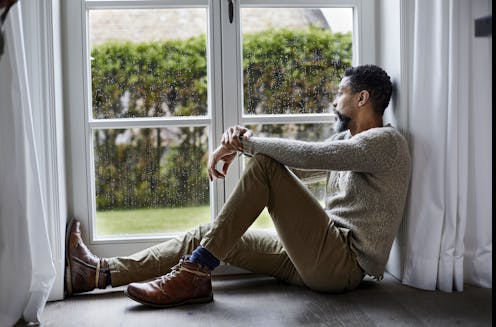Loneliness can kill, and new research shows middle-aged Americans are particularly vulnerable
- Written by Frank J. Infurna, Associate Professor of Psychology, Arizona State University

Middle-aged Americans are lonelier than their European counterparts. That’s the key finding of my team’s recent study[1], published in American Psychologist.
Our study identified a trend that has been evolving for multiple generations, and affects both baby boomers and Gen Xers. Middle-aged adults in England and Mediterranean Europe are not that far behind the U.S. In contrast, middle-aged adults in continental and Nordic Europe reported the lowest levels of loneliness and stability over time.
We used survey data drawn from over 53,000 middle-aged adults from the U.S. and 13 European nations from 2002 to 2020. We tracked their reported changes in loneliness every two years across the midlife years of 45 to 65. This span provided us data from the so-called silent generation of people born between 1937 and 1945; baby boomers, born between 1946 and 1964; and members of Generation X, born between 1965 and 1974.
Our study makes clear that middle-aged Americans today are experiencing more loneliness than their peers in European nations. This coincides with existing evidence that mortality rates are rising[2] for working-age adults in the U.S.
We focused on middle-aged adults for several reasons. Middle-aged adults form the backbone of society by constituting a majority of the workforce[3]. But they also face increasing challenges today, notably greater demands for support from both their aging parents and their children[4].
Following the Great Recession from late 2007 to 2009, middle-aged adults in the U.S. reported poorer mental and physical health[5] compared to same-aged peers in the 1990s. Compared to several European nations, U.S. middle-aged adults currently report more depressive symptoms[6] and higher rates of chronic illness, pain and disability[7].
Why it matters
The desire to belong is an innate and fundamental need[8]. When this is lacking, it can have downstream consequences.
Loneliness is bad for your health[9]. Researchers have found that loneliness is as dangerous as smoking[10]. Loneliness increases one’s vulnerability to sickness, depression, chronic illness and premature death[11].
Loneliness is considered a global public health issue. The U.S. surgeon general released an advisory report in 2023[12] documenting an epidemic of loneliness and a pressing need to increase social connection. Other nations, such as the U.K.[13] and Japan[14], have appointed ministers of loneliness to ensure relationships and loneliness are considered in policymaking.
You can be lonely even when surrounded by people.What still isn’t known
Why are middle-aged Americans exceptional when it comes to loneliness and poorer overall mental and physical health?
We did not directly test this in our study, but in the future we hope to zero in on the factors driving these trends. We think that the loneliness Americans are reporting compared to peer nations comes down to limited social safety nets and to cultural norms that prioritize individualism over community.
Individualization carries psychological costs, such as reductions in social connections and support structures, which are correlates of loneliness[15]. Relative to the other nations in our study, Americans have a higher tendency to relocate[16], which is associated with weak social and community ties.
One of the reasons why we chose countries from across Europe is that they differ dramatically from the U.S. when it comes to social and economic opportunities and social safety nets. Social and economic inequalities[17] likely increase one’s loneliness through undermining one’s ability to meet basic needs. Generous family and work policies[18] likely lessen midlife loneliness through reducing financial pressures and work-family conflict, as well as addressing health and gender inequities.
Our findings on loneliness in conjunction with previous studies on life expectancy, health, well-being and cognition suggest that being middle-aged in America is a risk factor for poor mental and physical health outcomes.
The Research Brief[19] is a short take on interesting academic work.
References
- ^ key finding of my team’s recent study (doi.org)
- ^ mortality rates are rising (nap.nationalacademies.org)
- ^ a majority of the workforce (doi.org)
- ^ aging parents and their children (doi.org)
- ^ poorer mental and physical health (doi.org)
- ^ more depressive symptoms (doi.org)
- ^ chronic illness, pain and disability (press.princeton.edu)
- ^ innate and fundamental need (doi.org)
- ^ bad for your health (theconversation.com)
- ^ as dangerous as smoking (doi.org)
- ^ sickness, depression, chronic illness and premature death (doi.org)
- ^ advisory report in 2023 (www.hhs.gov)
- ^ the U.K. (www.gov.uk)
- ^ and Japan (asia.nikkei.com)
- ^ which are correlates of loneliness (doi.org)
- ^ a higher tendency to relocate (doi.org)
- ^ Social and economic inequalities (doi.org)
- ^ Generous family and work policies (doi.org)
- ^ Research Brief (theconversation.com)
Authors: Frank J. Infurna, Associate Professor of Psychology, Arizona State University

